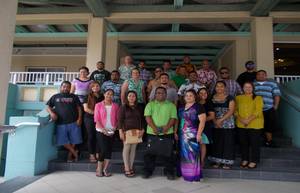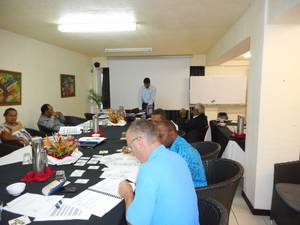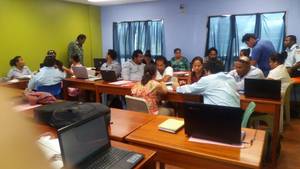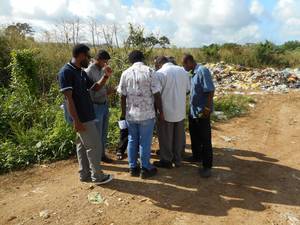Related News

The Institute of Applied Sciences (IAS) had recently delivered trainings in Kiribati, Royal Marshall Islands and Vanuatu as part of a Stockholm Convention on Persistent Organic Pollutants (POPs) project. The training to be delivered in 14 Pacific island countries supports the project’s overall aims which are to improve regional chemical management.
The training course was developed by IAS under a contract to the Secretariat of the Pacific Regional Environment Programme. Funding for the work was provided by the Global Environment Facility and implemented by the United Nations Environment Programme.
The training course for Vanuatu on 9-13 May 2016 was held at the Melanesian Hotel Conference Room, Port Villa and the course presenters were Dr Johann Poinapen, Acting Director, IAS, Usaia Dolodolotawake, Laboratory Manager Services, IAS and Salome Dolodolotawake, a Consultant and former Head of Science Teacher. Local assistance with planning and organisation was provided by the Vanuatu Environment Protection Authority.

The training course for Kiribati from 17-20 May 2016 took place at the USP Kiribati Campus, South Tarawa and the course presenters were Steven Sutcliffe, Chief Technician at the School of Biological and Chemical Sciences and Shalveen Raj, Assistant Project Manager, IAS. Local assistance with planning and organisation was provided by the Ministry of Environment, Lands and Agriculture Development (MELAD) and in particular the Environment Conservation Division (ECD).

For the Marshall Islands, the training occurred on 10-13 May 2016 at the Marshall Islands Resort, Majuro and the course presenter was Steven Sutcliffe. Local assistance with planning and organisation was provided by the Republic of the Marshall Islands Environment Protection Authority (RMI-EPA).
Participants of the course included those who are directly involved with the storage, handling, use or disposal of chemicals, and especially those who work in laboratories, or as science teachers, or whose work involves the supervision or management of laboratory facilities. It was also relevant to government officials with regulatory responsibilities in this area, including Customs Officers, who were given a more targeted half-day to one-day course.
A ‘train the trainers’ session was also conducted for half-a-day where interested participants were trained as potential trainers or facilitators for the Chemical Management training course. These people will organise localised and targeted training sessions in their respective organisations and countries.
Feedback received from the participants on the training material and content was very positive and they found the course very relevant and useful to the needs of their organisations and countries. Most comments related to the need in developing and maintaining accurate chemical inventories at organisational and national levels, identified as the most important follow up activity. Others commented on the need for chemical management plans to be developed and implemented, in-house training to be conducted utilising the materials provided in this training and the actual removal of hazardous chemical waste from the country. Participants also stressed the point to have “refresher” training every two years or “more frequently” for sustainability and further capacity building.

Dr Johann Poinapen stated that, in developing and delivering this chemical management training course, IAS continues to strengthen one of its core roles which is to organise short technical and scientific training courses that cannot be met through the normal teaching program of USP. IAS is the consulting arm of the Faculty of Science, Technology and Environment, and it markets the scientific and technical expertise of the Faculty to the region.